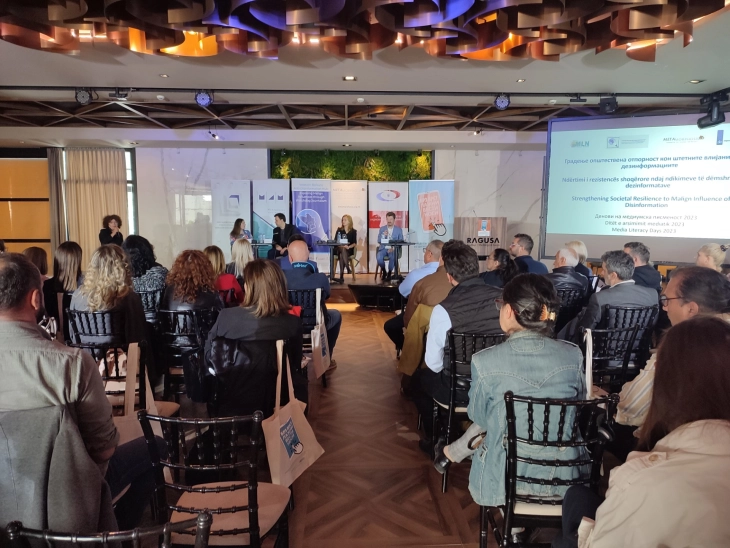Fifth Media Literacy Days event kicks off
- The population’s susceptibility to disinformation campaigns, conspiracies and other alternative narratives, is a consequence of structural factors that need to be addressed with concrete programs, instead of politicization, rejecting or ignoring practices, was highlighted at the introductory panel during the fifth day of the Media Literacy Days events, held under the motto "The Finger in Haste Makes Fake News Spread," taking place from Tuesday through October 31, organized by the Agency for Audio and Audiovisual Media Services and Media Literacy Network.

Skopje, 24 October 2023 (MIA) - The population’s susceptibility to disinformation campaigns, conspiracies and other alternative narratives, is a consequence of structural factors that need to be addressed with concrete programs, instead of politicization, rejecting or ignoring practices, was highlighted at the introductory panel during the fifth day of the Media Literacy Days events, held under the motto "The Finger in Haste Makes Fake News Spread," taking place from Tuesday through October 31, organized by the Agency for Audio and Audiovisual Media Services and Media Literacy Network.
Multiple events will be held during the remaining days, to encourage activities that will help citizens deal with the spread of fake news and disinformation. Which will also coincide with UNESCO's global activities in the fight against disinformation and media literacy in digital spaces.
Agency for Audio and Audiovisual Media Services director, Zoran Trajchevski, said that the spread of disinformation and fake news, especially though social media, is quite large, and that neither state institutions nor fact-checkers can verify all information.
"If you look at the internet, you can see copy-paste journalism, and one fake article is then spread by numerous media. Traditional media are perhaps more resilient, but they too sometimes, maybe not of their own will and due to certain omission, allow the spread of fake news and disinformation," Trajchevski said.
He added that due to social media's influence, it is important for citizens to become resilient to the spread of fake news and disinformation, bearing in mind upcoming elections in the context of making the right decision, not only this year, but also in the future.
"The process of raising media literacy is quite hard. As a Media Literacy Network and a state institution, we will persist and do everything we can to raise the media literacy level," Trajchevski stressed.

Metamorphosis Foundation member, Filip Stojanovski, led the first panel and in the name of all participants-civil society organizations (CSOs) part of the Media Literacy Network, said that a joint approach is necessary to raise the level of media literacy in society and resilience towards disinformation, two things that are often accompanied both domestic and foreign anti-democratic harmful influences.
"It is necessary for all state institutions, sectors in society, not only civil and media, but also the private sector, academics, researchers, educational institutions, medical sector, to work together address media literacy issues in their fields, to help citizens develop the skill set of media literacy. I believe that this is an important element for the development of democracy and economic prosperity in our country, and that though joint effort we can reach a higher level of knowledge and protect citizens' basic rights," Stojanovski said.
He pointed out that media literacy is not only a media, but also a security issue, both on a state level when dealing with geopolitical issues, and personal level when dealing with the protection of personal rights and economic stability, which is why cyber-attacks take advantage of low media literacy.

According to Macedonian Institute for Media (MIM) director, Biljana Petkovska, there is no media-literate nation if media literacy is not present in formal education, which is why three years ago, in cooperation with the Education Ministry, the Bureau for Education Development, supported by IREX and USAID, media literacy begun being taught in schools.
"I can proudly say that today, after three years, media literacy has become a large part of the curricula in primary schools, and we will soon being implementing in secondary schools. Thus, North Macedonia will become of the rare countries, if not the first in the region, to implement media literacy classes in primary and secondary education, soon to be included in all programs in the education process. Therefore, as a state we invest in the future of our citizens, societal prosperity and strengthening young people's competencies so that they can adapt and successfully participate in the new modern trends dictated by technology," Petrovska highlighted.

She assessed that in the past few years young people have made significant progress in media literacy, but that new technologies and the digital world is rapidly changing, so we have to "update our knowledge and be in line with changes."
In addition to educating young people, older citizens and pensioners are also included. The Institute of Communication Studies is in charge of that, besides working on media literacy in higher education, where new programs are being implemented, especially in the pedagogical institutions for training future professors. ssh/sk/
Photo: MIA







